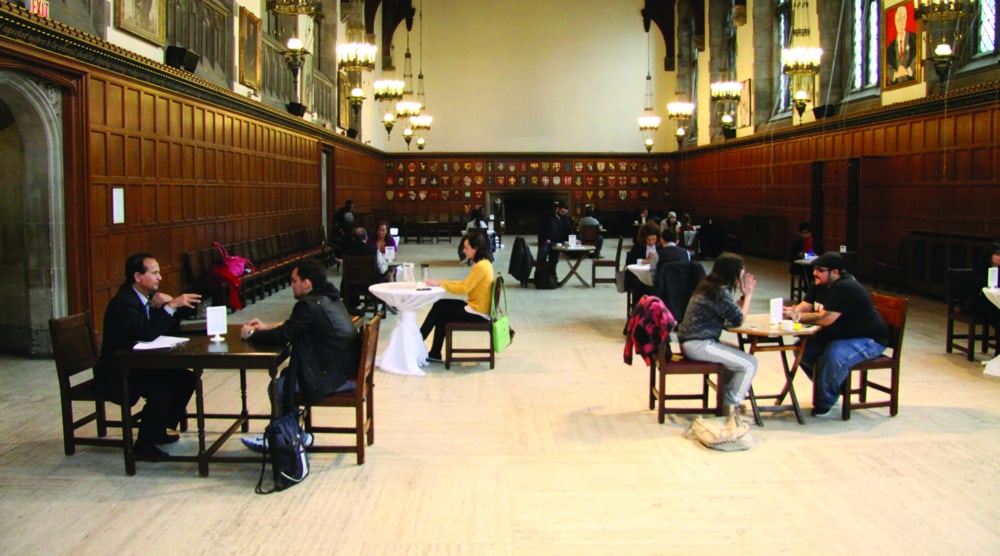This past Tuesday, Hart House held its third annual installation of the Living Library Project. The project gives attendees the opportunity to sign out a human book, and become a reader of their story. Similar events have been modeled all around the world in over 27 countries. The use of the word “libraries,” and the notion of people as readers and reading material express a unique context for communication between individuals who are otherwise strangers. The organization’s focus is to prompt organic and spontaneous conversations between people — how you interact will depend on you and your book.
Samy Saad, who has organized the event at Hart House for each year it has run, expressed that its continued return has been the result of enthusiasm and praise for the project by those who have attended. Hart House has presented the event in a unique way, shaping it in partnership with other campus organizations focused around social awareness, and adapting it to the institution’s co-curricular model. Saad explained that this means offering learning opportunities that enhance what is learned in class, providing experiential methods of learning. The Living Library Project’s organizing committee received suggestions for the event’s books from its on-campus partners, as well as through an open application submission. After reviewing all applicants, the best 15 to 25 are chosen.
With about 20 tables set up in Hart House’s great hall, the event was not nearly as crowded or bustling as I had expected it to be. In fact, it was very intimate. My first book was Michael Ianozzi, who was just as unsure of what to expect as I was. Along with a container of sour candies for readers to sample, Michael brought card stock sheets of facts of his life as well as cited information about mental illness and stigma. He chose to share his experience and knowledge of our society’s inability to provide accessible resources to those who suffer with mental illness. Michael is now a French Linguistics student at U of T, who mentors through accessibility services in order to provide support for his fellow students. This discussion would be a reflection of the rest of the day: to be thrown into such an important topic, which is so seldom discussed in the open and between concerned individuals, and with little more than an introduction of names to preface such personal thoughts and experiences was both unnerving and eye-opening.
I spoke next with Nikki Clarke, who titled her story ‘‘You’re always on time to start over,’’ based on her experience with leaving her teaching career to start her own business and talk show later in life. Nikki’s show reminded me of the Living Library itself, focusing on interviews with inspiring people and providing substance to media. Nikki’s show is available on YouTube but has been picked up by Rogers and will be airing in January. Nikki’s message of “edutainment” and determination went beyond merely inspiring her reader by providing proof that if you can see it, you can achieve it.
Terrence Rodriguez was another book who proved this, but in a very different way. Terrence is a transgender individual and advocate for queer youth in Rexdale, where he grew up. Before his organization, ‘‘RexPride,’’ there was no support centre for queer youth, and Terrence took it upon himself to correct this. Terrence also works with Leave Out Violence (LOVE), another youth organization. His work creates community resources, focusing on expression through arts and dialogue, and will soon implement educational workshops to combat ignorance and stigma in the West End community.
The project, as Hart House runs it, is more about dialogue across differences than it is about listening to one person simply narrate those differences. Many books had engaging stories about facing adversity as immigrants, women, and members of the queer community, to name a few, but their insights were more than a lecture or a speech. By directly sharing their experiences one-on-one, the books acted as alternatives to second-hand information, creating dynamic, engaging, and minimally structured interactions. The experience was incredible and unforgettable, and should there be a fourth annual Living Library Project, I will be among the first to register. I highly suggest you do, too.


